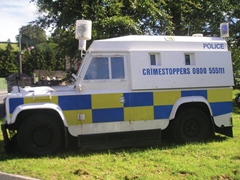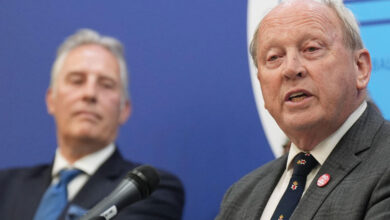Policing the border
 agendaNi reviews the PSNI and Garda’s cross-border policing strategy.
agendaNi reviews the PSNI and Garda’s cross-border policing strategy.
Introducing their joint strategy in December, PSNI Chief Constable Matt Baggott and then Garda Commissioner Fachtna Murphy explained that “many instances of terrorism, serious and organised crime, and local crime have been prevented” by sharing information, intelligence and joint operations.
“This has, undoubtedly saved lives, while ensuring those involved in such activity are identified and brought to justice,” said Murphy.
Baggott added that in the current security and economic climate it is “even more pertinent for police officers to be able to utilise the experience, knowledge and, technological capabilities available across both jurisdictions, to the best possible effect.”
The two law enforcement agencies have formalised their work together because, increasingly, criminals are trying to stay one step ahead of the law. Crime “strikes fear” into the heart of communities and “knows no boundaries,” they stated.
A joint Garda-PSNI tasking and co- ordination group will be established, as well as a strategy to maximise the safety of officers living and working in the border region. The existing co-operation on police visibility in border regions will be “underpinned” by detailed strategies that will be subject to review.
There will be greater co-ordination between the PSNI and Garda along the border. Joint operations will be more frequent in order to ensure more effective and visible policing and efficient use of resources. A multi-agency immigration strategy will be created to build on existing co-operation and a memorandum of understanding on the sharing of police equipment will be drawn up.
Legislation will be examined in order to “further enhance” the police services’ ability to work together to detect crime. The effectiveness of information-sharing on sex offenders and the use of automatic number plate recognition will also be reviewed. A memorandum of understanding in relation to sharing DNA, fingerprint and footprint information and the guidance manual for cross-border investigations will be finalised. In addition, Garda and PSNI radio systems will be inter-operable and a joint disaster planning protocol will be established.
Matt Baggott was “deeply indebted” to his Garda colleagues for their daily level of support and co-operation.
The Republic’s Justice Minister Dermot Ahern, from Dundalk, welcomed the strategy saying: “Those of us who hail from the border area understand better than most the importance of ensuring that the border does not present a barrier to the well-being and quality of life of those who reside on either side.” He especially praised the strategy’s commitment to accountability and continuous improvement.
Northern Justice Minister David Ford added that the strategy reinforces the commitment to ensuring that policing co- operation on both sides of the border continues at the highest level. He said that while it is “inevitable” that the strategy will focus on the terrorist threat, it also “shows the breadth of co-operation that exists across the full range of policing areas” and that both services will use all tools available to them to “ensure that those who seek to exploit the border for criminal ends will not succeed.”
However, the Chair of the Assembly’s Justice Committee, Lord Maurice Morrow is conscious of the fact that “throughout the Troubles we were told that co-operation between the then RUC and the Garda couldn’t be better and now we are being told again that it’s better than ever.”
The MLA, who represents Fermanagh and South Tyrone, adds: “I wonder if it is just a convenient thing to say?”
Morrow concedes: “I think [the cross- border policing strategy] is good and healthy in the pursuit of criminals as long as the sharing of information is transparent and it recognises there are two territories.”





